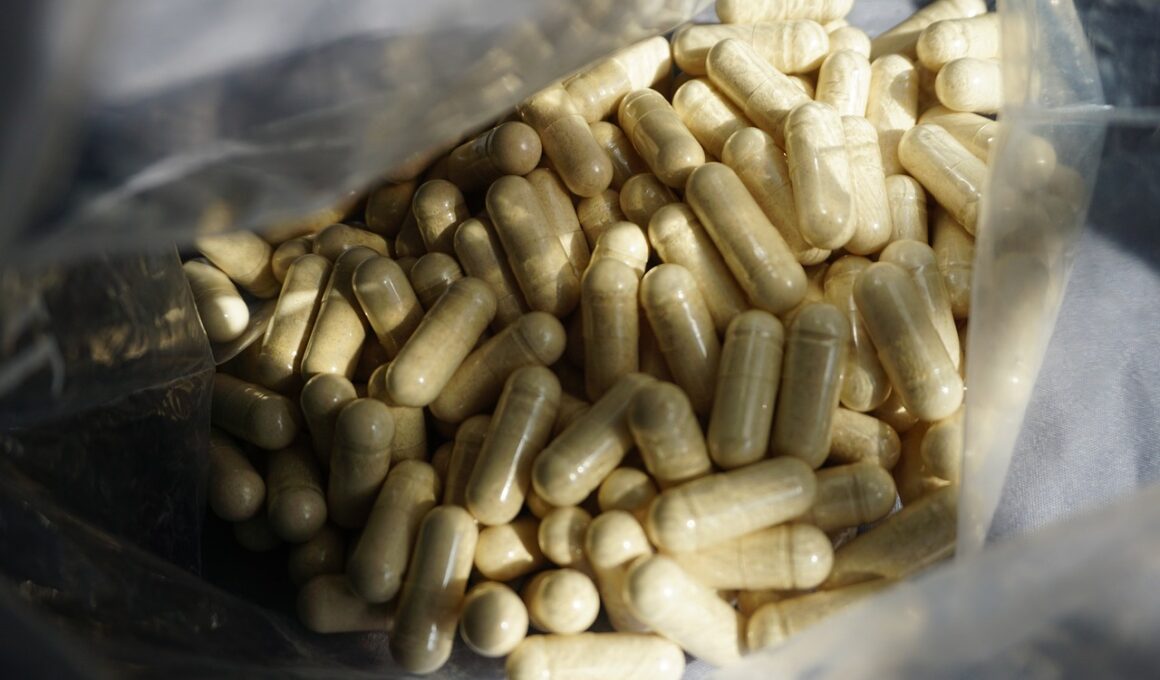The Importance of Iron Supplementation in Female Competitors
In the competitive world of female athletes, iron supplementation has gained significant attention due to its essential role in maintaining energy levels and overall health. Iron is vital for creating hemoglobin, which transports oxygen in the bloodstream. Many female competitors, especially those involved in endurance sports, may experience diminished iron levels. This decrease can lead to fatigue, impaired performance, and anemia. Thus, understanding the importance of iron supplementation is crucial for optimal athletic performance. It ensures that female competitors can train effectively and sustain their physical capabilities throughout intense competitions. Furthermore, proper iron intake improves recovery post-exercise. Moreover, female athletes often have higher iron requirements due to menstrual blood loss. Therefore, they must consider their iron levels and adjust their diets or supplementation strategies accordingly. Foods rich in iron, such as red meat, spinach, and legumes, can be helpful. However, sometimes diet alone isn’t sufficient, necessitating supplementation. Consulting healthcare professionals can also help athletes make informed decisions about dosage and timing of supplementation. This tailored approach can enhance athletic performance and overall well-being.
Understanding Iron Deficiency in Female Competitors
Iron deficiency is a common issue among female athletes, particularly in those participating in high-intensity sports. The body’s demand for iron increases with physical activity levels, as athletes require more oxygen during workouts. Unfortunately, several factors contribute to iron deficiency. For example, dietary choices, inadequate calorie intake, and even heavy menstrual cycles can lead to lower iron levels. Symptoms of deficiency may include fatigue, weakness, and dizziness, compromising performance during competitions. Iron plays a critical role in muscle function, energy production, and immune health. Hence, female competitors must prioritize adequate iron intake to ensure peak performance. Regular blood tests can help identify any deficiencies early. Moreover, increasing awareness in sports organizations about iron status can help educate female athletes. Health professionals can advise on the best types of iron supplements, such as ferrous sulfate or ferrous gluconate, and possible side effects, like gastrointestinal discomfort. Some athletes may also benefit from pairing vitamin C with iron supplements to enhance absorption. This multi-faceted approach can effectively combat iron deficiency in female competitors, leading to improved athletic outcomes.
In addition to promoting better performance, iron supplementation is linked to mental health in female athletes. Many individuals underestimate the psychological effects of physical performance. Iron depletion can lead to decreased cognitive function and poor concentration, which can affect an athlete’s focus during training and competitions. Research indicates that optimal iron levels can enhance mood and energy, vital factors in competitive settings. Female athletes often juggle various responsibilities, including training, work, and personal life, making mental clarity essential for success. Therefore, ensuring sufficient iron intake is more important than merely physical performance. Adequate iron levels can enhance mental resilience, critical during stressful competitions or training periods. This highlights the importance of education regarding iron’s multifaceted role in health and performance. Athletes should reconsider their nutrition and supplementation strategies, aiming for a holistic approach that encompasses both physical and mental well-being. Overall, integrating iron supplementation into a comprehensive nutritional plan can lead to improvements in both physical and mental performance, significantly benefiting female competitors. Hence, promoting awareness about iron’s importance for female athletes can contribute significantly to their performance and overall longevity in sports.
Choosing the Right Iron Supplement
When it comes to iron supplementation, not all products are created equal. Female competitors must find the appropriate type and dosage for their specific needs. Consulting with a healthcare professional is always advisable to determine individual requirements based on diet, level of activity, and iron status. Options include ferrous fumarate, ferrous sulfate, and iron bisglycinate, each with different absorption rates and potential side effects. It’s also essential to consider how iron supplements fit into the overall diet. Athletes should aim to integrate them seamlessly with other essential nutrients. For instance, consuming vitamin C-rich foods like oranges or potatoes alongside iron supplements can significantly enhance absorption. Timing is also critical; taking iron on an empty stomach can improve uptake but might cause gastrointestinal discomfort for some. Therefore, individual adjustments may be necessary based on personal tolerance. Many athletes also prefer incorporating more iron-rich whole foods into their diet alongside the supplementation. Foods including lean meat, fortified cereals, and leafy greens can provide excellent natural sources of iron while supporting overall health for athletes during rigorous training and competitions.
In conclusion, understanding the importance of iron supplementation in female competitors is crucial for optimal performance and health. The unique physiological needs of female athletes necessitate regular monitoring of iron levels as they can significantly impact training and competition success. Furthermore, low iron levels can lead to decreased performance, fatigue, and impaired recovery capabilities. By addressing this deficiency through proper dietary choices and supplementation, female competitors can enhance their athletic abilities. Education about the consequences of iron deficiency should be emphasized in sports programs, ensuring athletes know the signs and consequences of low iron levels. Additionally, fostering an open dialogue about supplementation and nutrition can empower female athletes to take charge of their health proactively. This empowerment not only supports their physical health but also reinforces their mental resilience, essential in competitive sports. Future research should continue exploring the optimal strategies for iron supplementation in female athletes, considering various sports and competition types. Overall, prioritizing iron intake is essential for those seeking to perform optimally in their athletic pursuits while fostering long-term health and vitality.
Long-Term Effects of Iron Supplementation
The long-term effects of appropriate iron supplementation in female athletes can lead to profound improvements in their overall performance and health outcomes. Regular intake of iron ensures that athletes can maintain their endurance, power, and overall well-being. Chronic iron deficiency, if left unaddressed, can result in lasting fatigue and diminished performance over time. Conversely, adequate iron levels contribute to physical and mental resilience, allowing athletes to bounce back more effectively from intense training. It also supports the immune system, which is crucial during heavy training periods when athletes are more susceptible to illness. By ensuring optimal iron levels, female competitors can perform consistently while minimizing the risk of burnout and performance plateaus. Moreover, as athletes age, their nutritional needs can change, making ongoing monitoring essential. Therefore, female competitors should consider regular consultations with nutritionists or healthcare providers to adapt their iron intake based on their evolving needs. The goal is not just peak performance but sustained athletic longevity. Education and awareness can help female competitors optimize their training and health through effective iron supplementation strategies to support their lifelong athletic journeys.
Ultimately, the discourse surrounding iron supplementation among female competitors must evolve to promote health sustainability. As research continues to unveil the complexities of iron’s impact on athletic performance, it’s crucial to remain updated with current guidelines and metrics. Female athletes should prioritize consultation with health professionals to devise personalized supplementation strategies tailored to their specific requirements. They could build a balanced diet that integrates iron sources through various food options, improving overall nutritional intake. Additionally, being vigilant about monitoring iron levels and being proactive with supplementation serves to optimize athletic performance. This approach not only enhances immediate performance but also supports longevity in the sport by preventing long-term fatigue and health issues. Furthermore, female athletes must share their experiences and insights regarding iron supplementation within their communities, fostering a culture of awareness and proactive health management. This collective effort can lead to improved athletic performance, increased awareness of nutritional needs, and ultimately, a vibrant athletic culture that prioritizes the health of female competitors. By recognizing the importance of iron supplementation, the future looks promising for female athletes striving for excellence in their sports.


